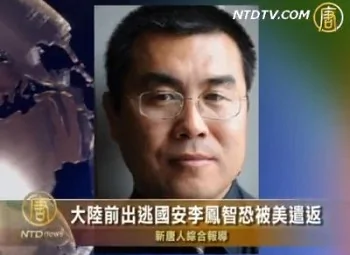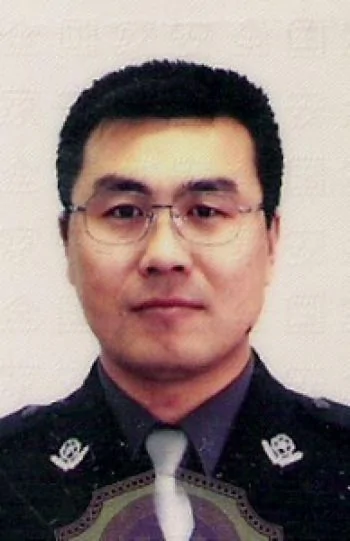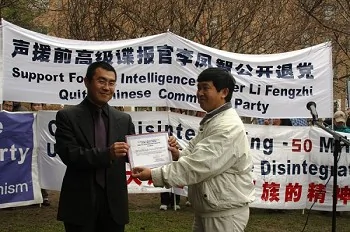


《華盛頓郵報》:大陸前出逃國安李鳳智恐被美遣返 Li Fengzhi, Chinese spy who defected to U.S., facing deportation
2010-09-06
據《華盛頓郵報》9月2日報導,曾於2004年滯留美國,申請政治庇護的前中共國安部諜報官李鳳智,恐將被美國遣返。
美國政府駁回李鳳智6年之久的政治庇護申請的原因不得而知,但據推測可能與間諜戰和更深層次的機密有關。
根據李鳳智的政治庇護申請材料,他於1990年大學畢業,然後進入中共國家安全部,2003年被中共安全部派送到美國丹佛大學學習國際政治和外交學並獲得了博士學位。新唐人
Li Fengzhi, Chinese spy who defected to U.S., facing deportation
The U.S. government is trying to deport Li Fengzhi, a veteran Chinese intelligence agent who defected here in 2004, back to China, where he could well be executed on charges of treason, he and others said in interviews.
The reasons for the government's six-year-long opposition to Li's application for political asylum, entangled in spy wars and layers of secrecy, are not easily discerned.
Li became an officer in the Chinese Ministry of State Security (MSS) upon graduation from college in 1990, according to his application for political asylum. In 2003, the spy agency sent him to the University of Denver to pursue a PhD in international politics and diplomatic philosophy, during which time he began to voice his criticism of the Chinese Communist Party.
During a trip home, Chinese security agents harshly interrogated him about his views. When he returned to Denver, he decided to apply for political asylum, on the basis that his increasingly outspoken views would subject him to retribution if he were forced to go back.
But he did not reveal his identity as a Chinese intelligence officer at the time, he said. His application was initially denied.
Two years later, petitioning again for asylum, Li volunteered to an immigration official that he had not mentioned that he had been an intelligence officer of China.
Nor had he volunteered that, 「because of the difficulties I had and the great danger to my family that I felt in those days, I decided to ask the CIA and FBI for help....」
In fact, Li was extensively debriefed by the FBI and CIA, he and others familiar with his case said.
But neither agency has stepped forward to help keep him from being deported, he and the others said. Although individual FBI agents were supportive of him, one source said, the bureau officially played down his intelligence value.
「Just getting verification that he worked with them has been an enormous task,」 said the source.
Neither agency could be reached for comment.
Rumors about Li's exact relationship with the CIA and FBI abound.
One explanation for their allegedly cool treatment of Li now, said a law enforcement source, was that he "oversold" himself -- inflated his rank in the MSS -- when he finally decided to cooperate with the FBI and CIA. Another line of thinking is that he rejected their overtures to work as their mole inside Chinese intelligence, and they feel they owe him no favors.
Whatever the truth, neither agency should get in the way of Li's effort to stay here now, said Michelle Van Cleave, chief of the National Counterintelligence Executive, a policy-setting arm of the Office of the Director of National Intelligence, during the Bush administration.
「I can’t understand why the Obama Administration would oppose Li’s application for asylum,」 she said. 「Can you imagine the fate that would await him if he were deported? Or what kind of a signal that would send?」
「Whether he came over with the crown jewels of Chinese intelligence or just some crumbs from the table, we should be welcoming him with open arms and encouraging others to follow,」 she said.
Li admitted he was ambivalent about asking the CIA and FBI for help. He wants to be known as a dissident, not a turncoat.
「My number one is the CCP」 -- the Chinese Communist Party of China, Li said. 「If they can connect me to U.S. intelligence agencies, they will use it against me.」
Other government agencies involved in Li’s case -- the departments of Justice and Homeland Security -- either did not respond to requests for comment or declined comment.
Li was critical of the handling of his case by DHS's Citizenship and Immigration Services, which processes asylum requests, saying in his halting English, 「I have a strong feeling they didn’t know this case very well.」
Later, in court proceedings led by a prosecutor with Immigration and Customs Enforcement, he said, 「I felt this lady」 -- he did not identify the prosecutor -- 「couldn’t understand the smallest thing about Chinese security agencies.」
Li made his latest case for political asylum at a hearing before an immigration judge in Denver on Monday. Another hearing is scheduled for Oct. 4, at which time he hopes his long quest to stay here will be over.
「I still hope the immigration system can make the right decision,」 Li said in a phone interview.
A Denver law firm, Lichter & Associates, has represented Li for the last four years. The current lead attorney on his case, Mark Robert Barr, said Li 「faces severe repercussions」 if he is forced to return to China, ranging from a 「lengthy prison term to capital punishment, with very little due process.」
「As an intelligence agent," Barr added, "he is at extreme risk.」
Retired FBI official I.C. Smith, one of the bureau’s top China experts, agreed.
In a letter to Denver immigration Judge Donn L. Livingston last March, Smith said 「Mr. Li has two fundamental problems: he betrayed the trust of the ubiquitous MSS and far more importantly, he denounced the CCP. These are unforgivable actions on the part of the MSS as well as the CCP.」
「Based on my past experience… I can state, without equivocation,」 Smith added, 「that if Mr. Li were to be returned to China that his punishment would be severe and devoid of civil liberties.」
The final decision on Li’s fate could rest with the Justice Department’s Executive Office for Immigration Review, said an official who asked not to be identified.
By Jeff Stein | September 2, 2010; 12:25 PM ET
2010-09-06
據《華盛頓郵報》9月2日報導,曾於2004年滯留美國,申請政治庇護的前中共國安部諜報官李鳳智,恐將被美國遣返。
美國政府駁回李鳳智6年之久的政治庇護申請的原因不得而知,但據推測可能與間諜戰和更深層次的機密有關。
根據李鳳智的政治庇護申請材料,他於1990年大學畢業,然後進入中共國家安全部,2003年被中共安全部派送到美國丹佛大學學習國際政治和外交學並獲得了博士學位。新唐人
Li Fengzhi, Chinese spy who defected to U.S., facing deportation
The U.S. government is trying to deport Li Fengzhi, a veteran Chinese intelligence agent who defected here in 2004, back to China, where he could well be executed on charges of treason, he and others said in interviews.
The reasons for the government's six-year-long opposition to Li's application for political asylum, entangled in spy wars and layers of secrecy, are not easily discerned.
Li became an officer in the Chinese Ministry of State Security (MSS) upon graduation from college in 1990, according to his application for political asylum. In 2003, the spy agency sent him to the University of Denver to pursue a PhD in international politics and diplomatic philosophy, during which time he began to voice his criticism of the Chinese Communist Party.
During a trip home, Chinese security agents harshly interrogated him about his views. When he returned to Denver, he decided to apply for political asylum, on the basis that his increasingly outspoken views would subject him to retribution if he were forced to go back.
But he did not reveal his identity as a Chinese intelligence officer at the time, he said. His application was initially denied.
Two years later, petitioning again for asylum, Li volunteered to an immigration official that he had not mentioned that he had been an intelligence officer of China.
Nor had he volunteered that, 「because of the difficulties I had and the great danger to my family that I felt in those days, I decided to ask the CIA and FBI for help....」
In fact, Li was extensively debriefed by the FBI and CIA, he and others familiar with his case said.
But neither agency has stepped forward to help keep him from being deported, he and the others said. Although individual FBI agents were supportive of him, one source said, the bureau officially played down his intelligence value.
「Just getting verification that he worked with them has been an enormous task,」 said the source.
Neither agency could be reached for comment.
Rumors about Li's exact relationship with the CIA and FBI abound.
One explanation for their allegedly cool treatment of Li now, said a law enforcement source, was that he "oversold" himself -- inflated his rank in the MSS -- when he finally decided to cooperate with the FBI and CIA. Another line of thinking is that he rejected their overtures to work as their mole inside Chinese intelligence, and they feel they owe him no favors.
Whatever the truth, neither agency should get in the way of Li's effort to stay here now, said Michelle Van Cleave, chief of the National Counterintelligence Executive, a policy-setting arm of the Office of the Director of National Intelligence, during the Bush administration.
「I can’t understand why the Obama Administration would oppose Li’s application for asylum,」 she said. 「Can you imagine the fate that would await him if he were deported? Or what kind of a signal that would send?」
「Whether he came over with the crown jewels of Chinese intelligence or just some crumbs from the table, we should be welcoming him with open arms and encouraging others to follow,」 she said.
Li admitted he was ambivalent about asking the CIA and FBI for help. He wants to be known as a dissident, not a turncoat.
「My number one is the CCP」 -- the Chinese Communist Party of China, Li said. 「If they can connect me to U.S. intelligence agencies, they will use it against me.」
Other government agencies involved in Li’s case -- the departments of Justice and Homeland Security -- either did not respond to requests for comment or declined comment.
Li was critical of the handling of his case by DHS's Citizenship and Immigration Services, which processes asylum requests, saying in his halting English, 「I have a strong feeling they didn’t know this case very well.」
Later, in court proceedings led by a prosecutor with Immigration and Customs Enforcement, he said, 「I felt this lady」 -- he did not identify the prosecutor -- 「couldn’t understand the smallest thing about Chinese security agencies.」
Li made his latest case for political asylum at a hearing before an immigration judge in Denver on Monday. Another hearing is scheduled for Oct. 4, at which time he hopes his long quest to stay here will be over.
「I still hope the immigration system can make the right decision,」 Li said in a phone interview.
A Denver law firm, Lichter & Associates, has represented Li for the last four years. The current lead attorney on his case, Mark Robert Barr, said Li 「faces severe repercussions」 if he is forced to return to China, ranging from a 「lengthy prison term to capital punishment, with very little due process.」
「As an intelligence agent," Barr added, "he is at extreme risk.」
Retired FBI official I.C. Smith, one of the bureau’s top China experts, agreed.
In a letter to Denver immigration Judge Donn L. Livingston last March, Smith said 「Mr. Li has two fundamental problems: he betrayed the trust of the ubiquitous MSS and far more importantly, he denounced the CCP. These are unforgivable actions on the part of the MSS as well as the CCP.」
「Based on my past experience… I can state, without equivocation,」 Smith added, 「that if Mr. Li were to be returned to China that his punishment would be severe and devoid of civil liberties.」
The final decision on Li’s fate could rest with the Justice Department’s Executive Office for Immigration Review, said an official who asked not to be identified.
By Jeff Stein | September 2, 2010; 12:25 PM ET








